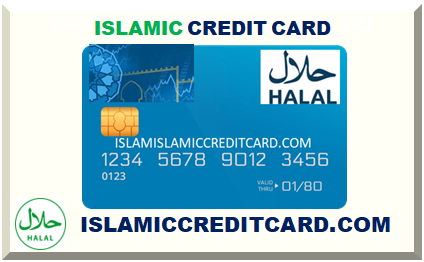
ISLAMIC CREDIT CARD 2024
HALAL CREDIT CARD SHARIAH COMPLIANT CREDIT CARD GOLD PLATINUM بطاقة ائتمان إسلامية
An Islamic credit card in 2024 is defined as a financial tool designed in compliance with Shariah principles, notably the prohibition of riba (interest). Unlike traditional cards, it uses Shariah-approved mechanisms such as Ujrah (service fee) or Murabaha (cost-plus sale) instead of interest-based transactions.
The Islamic credit card (in arabic بطاقة ائتمان إسلامية) aims to cater to the Muslim community by providing a halal (permissible) alternative to conventional credit cards. In doing so, its broader objective is to promote ethical financial practices in the banking landscape.
TThe role of an Islamic credit card extends beyond just facilitating cashless transactions. It serves as a bridge for Muslims and ethically-conscious individuals who wish to conduct their financial affairs without compromising their beliefs or values.
The objectives of an Islamic credit card are multifaceted. Primarily, it seeks to provide a halal (permissible) alternative to traditional credit cards, ensuring that users can manage their finances in line with Islamic teachings. Additionally, it promotes ethical and responsible financial behavior, as any penalties or fees typically get directed towards charitable causes, ensuring that the financial institution doesn't profit from the user's misfortune or oversight.

HOW IS AN ISLAMIC CREDIT CARD DIFFERENT FROM A CONVENTIONAL CREDIT CARD?
Difference between Islamic and Conventional Credit Cards
Islamic Credit Card:
- Operates in accordance with Shariah principles.
- Islamic credit card doesn’t allow the element of usury (high interest rates).
- Avoids charging or paying riba (interest).
- No compounding of profits: profit margin for the cardholders is fixed for the whole period (between 35 and 60 months) and the profit is charged based on the remaining balance. The profit is calculated on a monthly basis, based on a outstanding due or monthly total transactions.
- The bank issuing the payment card does not offer speculative financial products and does not invest in sectors that are not accepted by the Sharia.
- Uses alternative financing methods like Murabaha (cost-plus sale) or Ujrah (service fee).
- Penalties or late fees often go to charitable causes to ensure the bank doesn't profit from them.
Conventional Credit Card:
- Operates based on interest-based financial systems.
- Charges interest on unpaid balances.
- Applied interest rates are often usurious.
- Can have variable interest rates based on market conditions.
- Penalties and late fees are typically profit centers for the bank. li>These cards encourage to spend more than user perceives as income and motivate impulse spending, consumerism and debt proliferation.
HOW AN ISLAMIC CREDIT CARD WORKS ?
Islamic Credit Card Principles:
- Adheres to Shariah principles, notably the prohibition of riba (interest).
- Instead of interest, it employs Shariah-compliant financing methods.
- Any fees or penalties usually don't benefit the bank directly; they might be donated to charity or used for operational costs.
Financing Mechanisms:
- Ujrah: A fixed service fee for the services offered, rather than charging interest.
- Murabaha: The bank buys an item and sells it to the cardholder at a markup, repayable in installments. This is a cost-plus sale agreement.
- Tawarruq: The bank buys a commodity and sells it to the cardholder. The cardholder then sells the commodity (often back to the bank or to a third party) for cash.
Repayment:
- Cardholders are encouraged to repay the full amount before the due date to avoid fees or service charges.
- There's often a grace period, similar to conventional cards, where no fees are charged if the balance is cleared.
Benefits and Features:
- Many Islamic credit cards offer rewards, cashback, and other benefits similar to conventional cards.
- Most are backed by major networks like Visa or MasterCard, ensuring global acceptance.
TYPES OF ISLAMIC CREDIT CARDS
Islamic credit cards, like conventional cards, come in various types to cater to different needs. However, they all operate within the framework of Shariah principles. Here are some common types:
- Murabaha Credit Card: This card is based on a cost-plus sale contract. The bank purchases an item on behalf of the customer and then sells it back to them with a profit margin.
- Ujrah Credit Card: This card operates on a fee-based structure. Instead of charging interest, cardholders pay a fixed service fee for the services or benefits provided by the card.
- Tawarruq Credit Card: Involves a series of buy and sell transactions. The bank purchases a commodity and sells it to the cardholder on deferred payment terms. The cardholder then sells the commodity for cash.
- Qard Credit Card: This card is based on an interest-free loan (Qard) from the bank to the cardholder. The cardholder is obliged to repay the loan amount without any excess.
- Ijarah Credit Card: Operates on a leasing or hire-purchase basis. The bank purchases the item and leases it to the cardholder, who might have an option to buy it at the end of the term.
WHAT TYPES OF INSURANCES AND FINANCIAL SERVICES IS AN ISLAMIC CREDIT CARD INCLUDING?
Insurances and Financial Services in Islamic Credit Cards
Islamic credit cards, in alignment with Shariah principles, offer various insurances and financial services that are ethically structured. These include:
- Takaful Insurance: Instead of conventional insurance, Islamic cards might offer Takaful, a cooperative insurance where members contribute to a pool of funds to guarantee each other against loss or damage.
- Travel Benefits: Some cards provide Shariah-compliant travel insurance, covering incidents during travel, such as delays, lost baggage, or emergencies, without involving interest or uncertain elements.
- Purchase Protection: Purchases made with the card might be protected against theft or accidental damage for a certain period after the purchase date.
- Cash Withdrawal: Cardholders can withdraw cash from ATMs, but this feature typically operates based on a Qard (interest-free loan) or Tawarruq structure to avoid interest charges.
- Installment Plans: Cardholders can convert big purchases into installment payments, using mechanisms like Murabaha, where the total cost is transparent and fixed without additional interest.
DO ISLAMIC CREDIT CARDS OFFER REWARDS AND BENEFITS?
Rewards and Benefits of Islamic Credit Cards
Like their conventional counterparts, Islamic credit cards also offer a variety of rewards and benefits to cardholders, but they do so within the framework of Shariah principles. Here are some common rewards and benefits:
- Reward Points: Many Islamic credit cards have reward programs where cardholders earn points for every purchase. These points can be redeemed for gifts, vouchers, or even Hajj and Umrah packages.
- Cashback: Some cards provide cashback on certain categories of spending, ensuring that the cashback mechanism does not involve interest or non-halal sources.
- Travel Perks: Cardholders might enjoy complimentary airport lounge access, travel discounts, or even free air tickets, depending on the card's features and the spending threshold.
- Discounts: Partnering with various merchants, Islamic credit cards can offer exclusive discounts on dining, shopping, and other services.
- Zero or Low Foreign Transaction Fees: Some Islamic cards may either waive or charge minimal fees for transactions made in foreign currencies, benefiting frequent travelers.
WHAT HAPPENS IF I DON’T PAY OFF MY BALANCE FOR AN ISLAMIC CREDIT CARD?
If you don't pay off your balance for an Islamic credit card, several consequences can ensue, similar to conventional credit cards, but with some distinct differences due to Shariah principles:
Late Payment Fees: While Islamic credit cards do not charge interest (riba) because it's prohibited in Islam, they might impose a late payment fee if you miss your payment deadline. This fee is not meant to be a source of profit for the bank; instead, many Islamic banks will donate these fees to charity.
Increased Debt through Service Fees: Depending on the card's structure and terms, you might incur service fees (Ujrah) on the balance you owe. This isn't interest but a fee for the services provided by the bank.
Possible Legal Action: If the debt continues to go unpaid for an extended period, the bank might take legal action to recover the owed amount.
Debt Repayment Arrangements: If you're struggling to repay your debt, it's essential to communicate with the bank. Many Islamic banks, in line with the ethical principles of Islamic finance, will work with customers to find a suitable repayment plan.
ISLAMIC CREDIT CARD: COUNTRIES OFFERING HALAL CREDIT CARDS